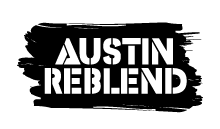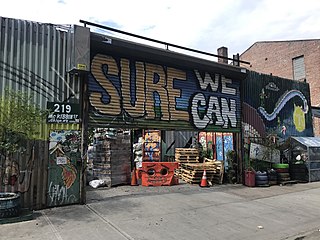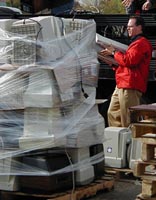 W
WAustin ReBlend is a paint recycling program administered by the City of Austin in Austin, Texas. In 2012, Austin ReBlend produced 12,767 US gal (48,330 l) of wholly recycled paint.
 W
WThe Moritz Bergstein Shoddy Mill and Warehouse are two historic industrial buildings in Stillwater, Minnesota, United States, in which Jewish German immigrant Moritz Bergstein conducted a recycling business circa 1890 to 1910 providing materials for mattresses. They were originally built in Oak Park Heights, Minnesota, around 1890 and were moved to neighboring Stillwater in 2012 to make way for construction of the St. Croix Crossing bridge. The property was listed on the National Register of Historic Places in 2008 for having local significance in the themes of industry and social history. They were nominated as a rare surviving embodiment of Minnesota's early Jewish immigrants and their frequent participation in the waste materials trade.
 W
WThe Center for the Development of Recycling (CDR) is a university-based, non-profit, environmental research and service organization. The CDR operates the recycling and reuse website RecycleStuff.org for the counties of Santa Clara and San Mateo, a recycling call center and household hazardous waste appointment system for Santa Clara County, and has completed over 60 contracted projects. The CDR is located in the Department of Environmental Studies at San Jose State University (SJSU). Faculty-managed service-learning university students collect and populate the website with data, respond to information requests from the public, and work on recycling and waste reduction projects for the community. CDR student's provide the community with a cost-effient public service. Hundreds of its service learning students have completed internships with local government and industry and over 100 have transitioned from college to sustainable materials management careers with industry and government.
 W
WChemetco was formerly one of the largest United States refiners of copper from recycled or residual sources.
 W
WThere are ten states in the United States with container deposit legislation, popularly called "bottle bills" after the Oregon Bottle Bill, the first such legislation that was passed.
 W
WCWG, also known as Communications Wireless Group, LLC, is a global repurposing source for the wireless industry that specializes in the recycling and reuse of old cell phones, smartphones and associated accessories.
 W
WInterConnection.org (IC) is an American 501(c)(3), non-profit organization headquartered in Seattle, Washington. InterConnection was established in 1999 by Charles Brennick. The organization's original focus was on developing and donating websites to non-profits in developing countries. The program soon expanded to include computer donations and technology training. In 2004 the InterConnection Computer Reuse and Learning Center opened in Seattle as a hub to serve both local and international communities.
 W
WThe Materials Innovation and Recycling Authority, formerly the Connecticut Resources Recovery Authority (1973-2014), is a quasi-public agency that provides single-stream recycling and trash disposal for Connecticut cities and towns. It owns a trash-to-energy plant in Hartford, oversees another in Preston, and financed the development of others in Bridgeport and Wallingford.
 W
WThe Oregon Bottle Bill is a container-deposit legislation enacted in the U.S. state of Oregon in 1971 and went into effect in October 1972. It was the first such legislation in the United States. It has been amended in 2007 and 2011. It requires applicable beverages in applicable sizes in glass, plastic or metal cans or bottles sold in Oregon to be returnable with a minimum refund value. The refund value was initially 5 cents until April 1, 2017 when it increased to 10 cents. The Oregon legislature has given the Oregon Liquor Control Commission the authority to administer and enforce the Bottle Bill. During the COVID-19 pandemic, the enforcement has been suspended several times. Oregon Beverage Recycling Cooperative (OBRC), a private cooperative owned by retailers and beverage distributors administers the collection and transportation of returned containers and keeps all the unclaimed deposit. Materials from returned containers are sold by the OBRC and proceeds are handed out to beverage distributors.
 W
WRecology is an integrated resource recovery company headquartered in San Francisco, California. The company collects and processes municipal solid waste, reclaiming useful materials that would have otherwise been buried in a landfill. The company also operates transfer stations, materials recovery facilities (MRFs), a number of landfills, and continues to spearhead renewable energy projects. Recology is the largest organics compost facility operator by volume in the United States.
 W
WSure We Can is a non-profit redemption center based in Brooklyn, New York.
 W
WTechForward is an electronics recycling startup business founded in 2006 and backed by venture capital, which insures electronics against upgrade. Based in California, it sells "upgrade policies" that guarantee it will buy back working electronics within two years of purchase. It offers policies on computers, TVs, DVD players, and satellite navigation systems. It then resells or recycles the electronics.
 W
WThe Tennessee Bottle Bill is citizen-supported container-deposit recycling legislation, which if enacted will place a 5-cent deposit on beverage containers sold in Tennessee. The bill applies to containers made of aluminum/bimetal, glass or any plastic, containing soft drinks, beer/malt beverages, carbonated or non-carbonated waters, plain or flavored waters, energy drinks, juices, iced teas or iced coffees. Milk/dairy, nutritional drinks and wine and spirits are not included in the program.
 W
WTire recycling in the United States is the disposal and reuse of waste tires.
 W
WThe Post Office Box Lobby Recycling program is a project of the United States Postal Service (USPS) that was created on October 28, 2008, for consumers to recycle paper items, using recycling bins placed in the customer lobbies of post office buildings. Some of the goals of the program are to reduce the amount of paper waste going to landfills, which helps to reduce the consumption of fiber from trees used for paper production and greenhouse gas emissions associated with waste disposal. USPS receives revenue from selling the material, and no tax dollars are used to fund the project. USPS was reported as having recycled over 200,000 tons of waste in 2009, including paper, plastics and other waste.